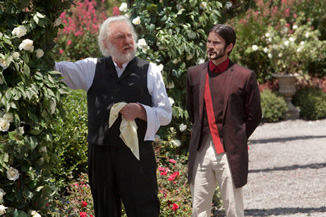|
|
Book vs. Movie: The Hunger GamesBy Russ BickerstaffMarch 28, 2012
The Book As the book opens, we are introduced to the protagonist and her family. Her mother and her sister are there. As it turns out, she’s a hunter. She goes out to poach game to help feed her family. She lives in a country called Panem, which evidently is the US after some kind of massive apocalyptic event. A number of districts answer to a totalitarian authority. It’s not a big, happy fascist dictatorship, though. Evidently one of the original 13 districts rose up against the government and was subsequently squelched. Now the remaining districts are reminded of the power of the rule of the Panem government by way of annual televised games involving a group of children fighting each other to death. Okay. Fine. Stop it right there. This is all interesting and everything, but it IS kind of derivative. (There’s a lot of precedence here, most recently the 1999 novel Battle Royale, but also the old video game SMASH TV, the older film The Running Man…Beyond Thunderdome, Death Race 2000 and a seemingly endless parade of dystopian death-duel sci-fi stories that stretch back arguably to the dawn of the sci-fi genre.) But where did the idea come from this time? As legend has it, Suzanne Collins was flipping through channels when she found herself spotting the rather dramatic juxtaposition between a reality show and the invasion of Iraq. This gave her the idea for The Hunger Games. Okay, fine, but that doesn’t make the idea terribly original. This sort of thing has been done before - which is perfectly fine so long as Collins can do something with it that is fresh and new. Certainly if that were the case, it would go a long way towards explaining the novel’s commercial success.
[ View other columns by Russ Bickerstaff ]
[ View other Book vs. Movie columns ]
[ Email this column ]
|

|
|
|

|
Friday, November 1, 2024
© 2024 Box Office Prophets, a division of One Of Us, Inc.


